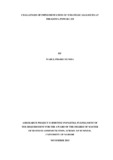| dc.description.abstract | State corporations have come under close scrutiny on their efficiency in performance and service delivery. Restructuring of the state corporation has therefore been undertaken to create a sense of urgency in their performance. Restructuring of the energy sector lead to the birth of KENGEN, GDC, and KETRACO. Kenya Power was left with the business of power distribution and connecting of customers. With a more focused business Kenya Power is expected to improve its performance because the excess baggage of power generation and transmission was transferred to KENGEN, GDC and KETRACO. Kenya Power is focused on implementing its strategies and enhancing the performance to achieving vision 2030. Strategic alliances have been used as one of the vehicles to enable strategy implementation by Kenya Power. This research project was a case study on Kenya Power. The objective of the study was to determine the challenges of implementation of strategic alliances at Kenya Power. In order to meet the objectives, primary data was collected through the use of interview guide instrument. Data collected was analyzed qualitatively by use of content analysis method. The study established that the major challenges of implementation of strategic alliance are either the “hard” or “soft challenges. The hard challenges are organizational based and includes; management coordination, management control and implementation, structure and organizational culture. The soft challenges includes; human resource skills and competencies, opportunistic tendencies and conflict. Challenges of implementing strategic alliances were also noted to impact strategy implementation. The study established that management control impacts or the strategies of power cost, power distribution and transmission loss; management control impacts or strategic fit between partners; structure and culture impacts on customer care and responses between Kenya Power and alliance partners. Human resource skills and competencies as well as opportunistic behaviours were noted to be associated with unilateral contracts. The study revealed that Kenya Power has the highest clientele because individual and industrial consumers use power. It recommends that the organization looks “outside the box” and strategize on a long term, how to be self-sufficient. It should utilize technology and knowledge therefore to produce some of externally acquired products and services. Establishing mobile phone, bank and Insurance Service would emancipate Kenya Power from the alliances with Safaricom, Banks and Insurance Companies. This would however require a repeal of the Act that create Kenya Power. | en_US |

